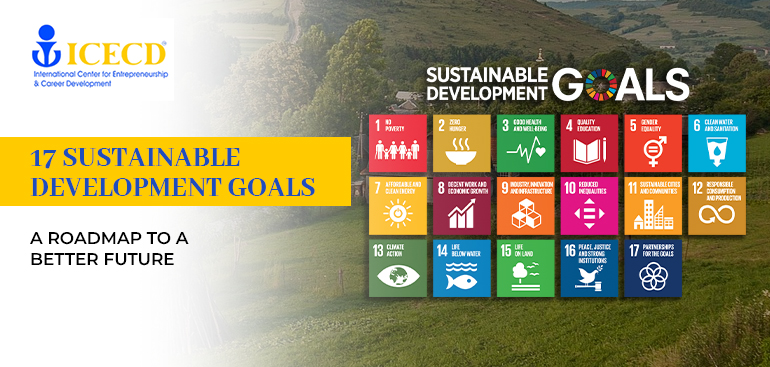In 2015, the United Nations adopted the 2030 Agenda for Sustainable Development, a universal call to action to end poverty, protect the planet, and ensure peace and prosperity for all. At the heart of this agenda are 17 Sustainable Development Goals (SDGs)—a blueprint for creating a better, more equitable, and sustainable world.
Whether you’re a student, policymaker, development practitioner, or entrepreneur, understanding these goals is critical for building inclusive, long-term solutions. In this comprehensive guide, we explore the 17 Sustainable Development Goals, their relevance to India. ICECD’s developmental interventions contribute to achieving them.
What are the Sustainable Development Goals (SDGs)?
The Sustainable Development Goals (SDGs) are a set of 17 interconnected global objectives designed to address the most pressing challenges of our time – ranging from poverty and inequality to climate change and responsible consumption. These goals aim to balance economic growth, social inclusion, and environmental protection, leaving no one behind.
- Target Year: 2030
- Applicability: All countries—developed and developing
- Nature: Interconnected and indivisible
Why SDGs Matter for India
India, home to one-sixth of humanity, plays a crucial role in the global achievement of SDGs. From rural development and entrepreneurship to gender equality and climate resilience, every goal aligns with the challenges and opportunities of India’s diverse socio-economic landscape.
Organizations like ICECD (International Centre for Entrepreneurship and Career Development) integrate SDG-aligned approaches in capacity building, microenterprise promotion, women empowerment, and sustainable rural transformation.
The 17 Sustainable Development Goals Explained
1. No Poverty
End poverty in all its forms everywhere.
This goal addresses income inequality, access to basic services, and social protection systems. Microfinance, skill development, and entrepreneurship are key enablers.
2. Zero Hunger
End hunger, achieve food security, and promote sustainable agriculture.
SDG 2 focuses on nutrition, agricultural productivity, and farmer welfare—vital for India’s rural economy.
3. Good Health and Well-being
Ensure healthy lives and promote well-being for all at all ages.
This includes access to quality healthcare, mental health services, and disease prevention programs.
4. Quality Education
Ensure inclusive and equitable quality education and promote lifelong learning.
From basic literacy to vocational training, education remains the backbone of sustainable development.
5. Gender Equality
Achieve gender equality and empower all women and girls.
Key themes include equal pay, leadership roles, protection from violence, and economic empowerment through training and enterprise.
6. Clean Water and Sanitation
Ensure availability and sustainable management of water and sanitation for all.
This goal supports investments in safe drinking water, hygiene education, and efficient water usage systems.
7. Affordable and Clean Energy
Ensure access to affordable, reliable, sustainable, and modern energy.
Promotion of solar energy, energy-efficient systems, and clean cooking fuels is central to this goal.
8. Decent Work and Economic Growth
Promote sustained, inclusive economic growth and full, productive employment.
ICECD’s entrepreneurship and MSME development directly align with SDG 8.
9. Industry, Innovation and Infrastructure
Build resilient infrastructure, promote inclusive industrialization, and foster innovation.
It emphasizes technology adoption, sustainable industries, and rural infrastructure development.
10. Reduced Inequalities
Reduce inequality within and among countries.
This includes social, economic, and political inclusion of all, especially marginalized communities.
11. Sustainable Cities and Communities
Make cities inclusive, safe, resilient, and sustainable.
Focus areas include affordable housing, green public transport, and disaster risk reduction.
12. Responsible Consumption and Production
Ensure sustainable consumption and production patterns.
This goal promotes resource efficiency, waste reduction, and eco-friendly business practices.
13. Climate Action
Take urgent action to combat climate change and its impacts.
The adoption of climate-resilient practices, carbon neutrality, and environmental education is key.
14. Life Below Water
Conserve and sustainably use the oceans, seas, and marine resources.
Essential for promoting marine biodiversity, reducing plastic waste, and sustainable fishing.
15. Life on Land
Protect, restore, and promote sustainable use of terrestrial ecosystems.
Targets include reforestation, wildlife conservation, and sustainable agriculture.
16. Peace, Justice, and Strong Institutions
Promote peaceful and inclusive societies, access to justice, and accountable institutions.
This includes reducing corruption, strengthening legal systems, and human rights protection.
17. Partnerships for the Goals
Strengthen implementation and revitalize global partnerships.
Collaboration between governments, NGOs, the private sector, and communities is essential.
ICECD’s Alignment with the SDGs
As a pioneering institution in sustainable development and entrepreneurship, ICECD actively supports multiple SDGs through:
- Women-led Microenterprises (SDGs 1, 5, 8)
- Skill Training Programs (SDGs 4, 10)
- Sustainability and Climate Courses (SDGs 13, 12)
- Rural Development Projects (SDGs 2, 6, 9)
- Collaborations and Community Partnerships (SDG 17)
Through these interventions, ICECD contributes to systemic change at the grassroots, creating scalable and sustainable impact.
Challenges in Achieving SDGs in India
While India is making progress, several challenges remain:
- The urban-rural disparity in access to education and health
- Low awareness of SDGs at the community level
- Climate vulnerability in agriculture-dependent regions
- Lack of data for localized monitoring
Overcoming these hurdles requires innovative grassroots models, awareness campaigns, and inclusive governance – a focus area for ICECD.
Conclusion: Our Shared Responsibility
The 17 Sustainable Development Goals are not just a framework—they are a global promise to future generations. Every individual, institution, and government has a role to play.
At ICECD, we believe that true development lies in empowering people, enabling ideas, and creating ecosystems that nurture sustainability. Together, we can accelerate India’s journey toward achieving the SDGs by 2030.
Also Read:



